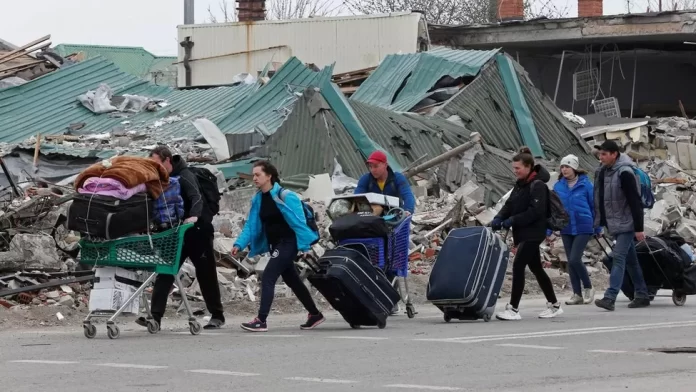Pressure is mounting on Ukrainian troops and civilians hunkering down in Bakhmut, as Kyiv’s forces try to help residents flee amid what Western analysts say may be preparations for a Ukrainian withdrawal from the eastern city Russian forces have spent months trying to capture.
A woman was killed and two men were badly wounded by shelling while trying to cross a makeshift bridge out of Bakhmut on Saturday, according to Ukrainian troops who were assisting them.
A Ukrainian army representative who asked not to be named for operational reasons told The Associated Press it was now too dangerous for civilians to leave the city in Donetsk province by vehicle and that people had to flee on foot instead.
Bakhmut has for months been a key target of Moscow’s grinding eastern offensive, with Russian troops, including large forces from the private Wagner Group, inching ever closer to Kyiv’s key eastern stronghold.
An AP team near Bakhmut on Saturday saw a pontoon bridge set up by Ukrainian soldiers to help the city’s few remaining residents reach the nearby village of Khromove. Later, they saw at least five houses on fire as a result of attacks in Khromove.
Ukrainian units over the past 36 hours destroyed two key bridges just outside Bakhmut, including one linking it to the nearby town of Chasiv Yar along the last remaining Ukrainian resupply route, according to U. military intelligence officials and other Western analysts.
The UK defence ministry said in the latest of its regular Twitter updates that the destruction of the bridges came as Russian fighters made further inroads into Bakhmut’s northern suburbs, ratcheting up the pressure on its Ukrainian defenders.
The Institute for the Study of War (ISW), a Washington-based think tank, assessed late on Friday that Kyiv’s actions may point to a looming Ukrainian pullout from parts of the city. It said Ukrainian troops may “conduct a limited and controlled withdrawal from particularly difficult sections of eastern Bakhmut”, while seeking to inhibit Russian movement there and limit exit routes to the west.
Capturing Bakhmut would not only give Russian fighters a rare battlefield gain after months of setbacks, but it might rupture Ukraine’s supply lines and allow the Kremlin’s forces to press toward other Ukrainian strongholds in the eastern Donetsk region.
As the fighting raged on, civilians remaining in the area spoke about their daily struggles amid near-constant enemy fire.
Bakhmut resident Hennadiy Mazepa and his wife Natalia Ishkova both chose to remain in Bakhmut, even as fierce battles reduced much of the city to rubble. Speaking to the AP on Saturday, Ishkova said that they suffered from a lack of food and basic utilities.
“Humanitarian [aid] is given to us only once a month. There is no electricity, no water, no gas,” she said.
“I pray to God that all who remain here will survive,” Ishkova added.
At the United Nations on Friday (Saturday NZ time), deputy spokesman Farhan Haq said UN humanitarian staff reported “intensive hostilities” near Bakhmut and say the organisation’s few humanitarian partners on the ground are focusing on evacuating the most vulnerable people from the conflict area”.
Also on Saturday, Russia’s defence chief travelled to Ukraine’s embattled east to inspect troops and to award them with state decorations, the Russian Defence Ministry said.
Defense Minister Sergei Shoigu visited a command post of Russia’s Eastern forces, where he was briefed by regional commander Rustam Muradov, according to a video published by the ministry. The video did not disclose the command post’s location.
Elsewhere, Ukraine’s emergency services reported on Saturday morning the death toll from a Russian missile strike on Thursday that hit a five-story apartment building in southern Ukraine had risen to 11.
The Main Directorate of Ukraine’s State Emergency Service said in an online statement that rescuers overnight had pulled three more bodies from the wreckage, some 36 hours after a Russian missile tore through four floors of the building in the riverside city of Zaporizhzhia. It said a child was among those killed, and the rescue effort was ongoing.
Russian shelling on Saturday also killed two residents of front-line communities in the surrounding Zaporizhzhia region, the local military administration reported in a Telegram post.
A 57-year old woman and 68-year-old man also died in Nikopol, a town further west that neighbours the Zaporizhzhia nuclear power plant, as Russian forces stationed there fired artillery shells and rockets at Ukrainian-held territory across the Dnieper river, regional Governor Serhiy Lysak reported.
In the western city of Lviv, hundreds of kilometres from the war’s front lines, Ukrainian President Volodymyr Zelenskyy met on Saturday with the head of the European Union parliament.
Hours earlier, Zelenskyy held talks with US Attorney General Merrick Garland and top European legal officials on how to hold Russia accountable for its actions in Ukraine.
In a joint press briefing with Zelenskyy, European Parliament President Roberta Metsola said that “all those responsible” for suspected Russian war crimes in Ukraine, including Russian President Vladimir Putin, must be brought to justice before a durable peace is achieved.
Metsola voiced support for the EU’s announcement on Thursday that an international centre for the prosecution of the crime of aggression – the act of invading another country – would be set up in The Hague to investigate Russia’s invasion.
She also called for Ukraine to start negotiations on joining the 27-nation-bloc as early as this year, and urged Western nations to keep arming the country’s military as it strives to keep Russian forces at bay in the east and south.
“Ukraine’s future is in the European Union. We will walk all the way with you,” Metsola said on Twitter late on Friday.
The EU agreed in June to put Ukraine on a path toward membership, setting in motion a process that could take years or even decades. However, Moscow’s invasion and Ukraine’s request for fast-track consideration have lent urgency to the negotiations.













